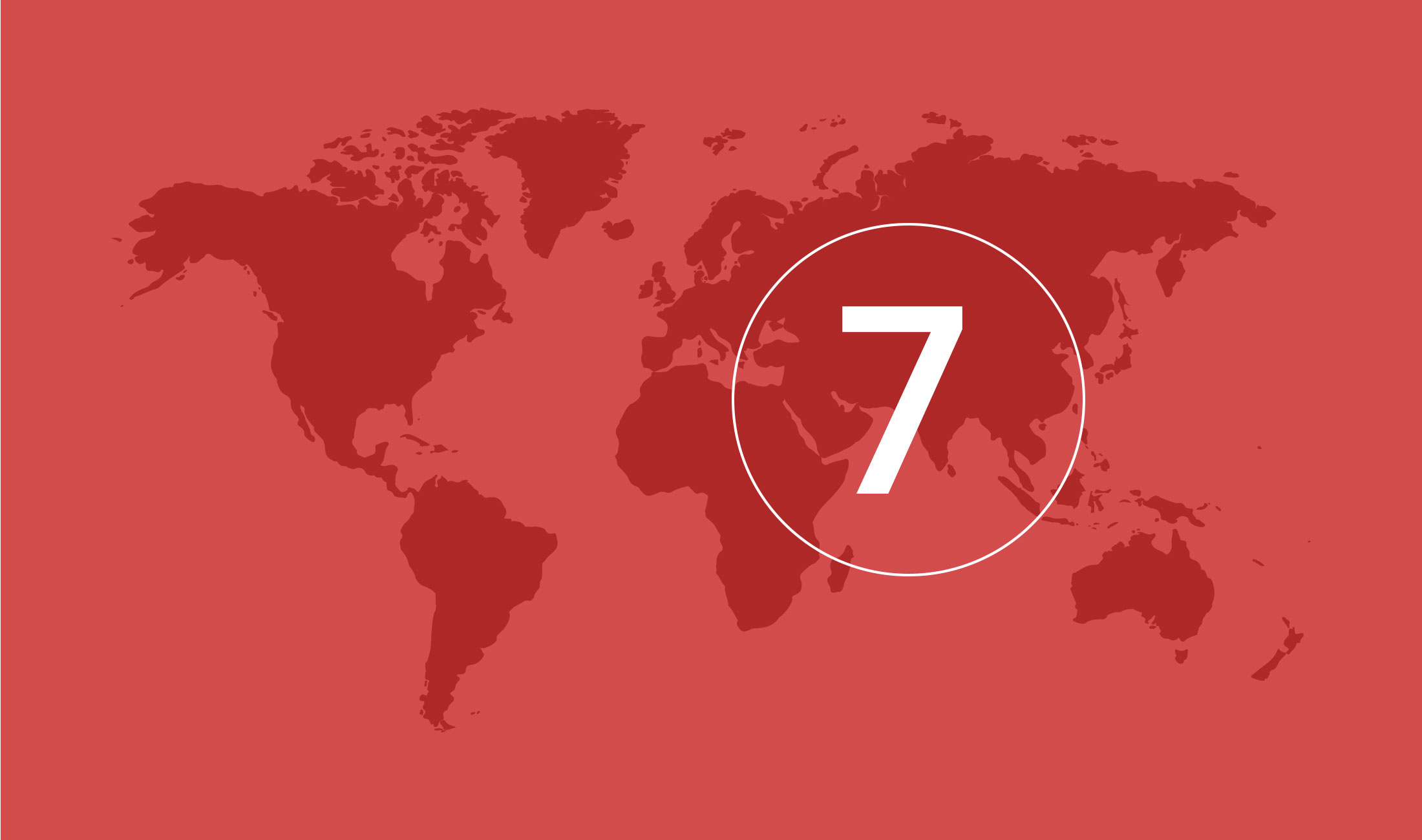
Tunisia
Category
7 of 7
| Risk type | Short | Long |
|---|---|---|
| Sovereign | ||
| Public | ||
| Bank | ||
| Corporate |
The icons indicate EKN's risk assessment.
A lower country risk category means a lower country risk. The icons mark EKN's ability to cover risks to different buyers in the country.
-
No policy established
- EKN has not analysed this country recently and therefore has no current opinion. If an exporter submits an application for such a country, EKN performs an analysis of the country at short notice and determines a policy.
-
Normal risk assessment
- EKN decides on guarantee issue based on an assessment of risk in the transaction. There are no predefined restrictions in the risk assessment or assumptions for risk assessment.
-
Restrictive risk assessment
- EKN sets stricter requirements in the risk assessment in order to guarantee a transaction. EKN may have specified special criteria that are key to the risk assessment of the guarantee holder category in question. This may mean that EKN sets a requirement that the counter party must have its own hard currency earnings or that external support can be expected, or that EKN sets a requirement for a letter of credit, government or bank guarantee. If the formulation of the transaction deviates from a defined restriction, we normally set more stringent conditions and may in the worst case refuse to guarantee the transaction. More stringent conditions may be that we reduce the sum guaranteed, raise the premium or require some form of security.
-
Normally off cover
- Here EKN does not normally cover currency transfer risks. However in some circumstances EKN may be able to go further with high risk countries than the restrictions of the country policy indicate. The application is then tested under the so-called GSL facility, which refers to guarantee issue with special country evaluation. There are specific requirements for this, primarily that the exporter has experience of the market in question. The risk is then shared with the exporter and by means of a mark-up on the premium.
-
OECD or EU countries
- Because of EU rules, EKN cannot issue guarantees for transactions with a risk period of less than two years for exports to Australia, EU countries, Iceland, Japan, Canada, Norway, New Zealand, Switzerland or the USA. If you have any questions, please telephone us on +46 8-788 00 00.
Country risk analysis
Country Risk Analysis of Tunisia
The latest Country Risk Analysis of Tunisia was issued in August 2022.
The coronavirus pandemic put additional strain on a highly indebted economy
More than a decade ago, protests in Tunisia sparked the Arab Spring. This popular uprising in Tunisia, which came to be known as the Jasmine Revolution, protested unemployment, poverty and corruption, among other things.
Tunisia has since been held up as the successful example of democratisation from the Arab Spring, however the road to democracy and economic development has faced setbacks.
Average GDP growth has been weak over the past decade, at no more than one percent per year. The economy is driven largely by tourism, which accounts to almost 15% of GDP. Beyond that, it is driven by the agricultural, mining and manufacturing sectors. Despite a relatively diversified economy, with developed public institutions and a high level of education, the economic situation has deteriorated sharply in recent years.
The coronavirus pandemic aggravated the situation further. The absence of tourism combined with a societal shutdown caused the economy to shrink by more than 9 percent in 2020. Tunisia is not expected to reach pre-pandemic economic output levels until 2024.
Tunisia’s weaknesses include high levels of public debt and structural fiscal deficits. High levels of sovereign and external debt (82 and 83 percent of GDP respectively) leave the economy exposed to financial markets and the possibility of debt refinancing. The present structural current account and fiscal deficits create a dependence on external financing.
The country’s external liquidity is weak and a large portion of the sovereign debt is denominated in foreign currency, making it sensitive to fluctuations in exchange rates. Foreign exchange reserves have been declining in recent years, however with the IMF’s increased allocation of Special Drawing Rights in 2021, the reserves have increased and are now equivalent to close to four months of import cover.
Continued economic downturn expected
The fallout from the war in Ukraine is putting severe pressure on the country’s economy. Tunisia imports both energy and food, with 80% of its wheat being imported from Russia and Ukraine. Increased food and energy prices, combined with a lack of tourism, are adding to already rising inflation and a deterioration of the country’s external position.
The slowdown in growth is seen as caused in part by restricted public spending, which is expected to dampen economic growth in the coming years. Political uncertainty is further weakening the economy. Since President Kais Saied dismissed the prime minister and suspended the Parliament in July 2021, the central government has become increasingly authoritarian.
The President recently called a referendum on a new Constitution, which was voted into effect. The new Constitution gives the President extensive powers over the central government and the judiciary, along with limiting the role of Parliament.
In the long term, the country’s significant external financing needs pose a risk. Even though a large part of the debt is in the form of soft loans (with low interest rates and long maturities), it represents a significant risk due to Tunisia’s lack of access to international capital markets. The risk premium on government bonds peaked (above 2,000 bps) end-March 2022, which is well above the recommended upper limit (600 bps) for debt sustainability by the IMF.
Risks are balanced against access to financial support from multilateral donors and a relatively good relationship with the IMF. The country has had an IMF programme since 2016 and received support during the coronavirus pandemic. Negotiations with the IMF for a new programme are continuing, but slowly. The IMF is demanding further reforms in subsidies and the public sector’s salary costs.
An unstable political landscape since the Arab Spring has hampered the implementation of structural and fiscal reforms. In the past the country has benefited from its strong and relatively well-developed institutions, but more recently a negative trend is also observed in all measures of institutional quality. Protests against a weakening economy flare up continuously and the risk of social unrest is high.
Over the long term, progress is hampered by the high level of uncertainty. A new IMF programme would counter the risk of balance of payments problems, but many reforms will need to be implemented to ensure its success. It is difficult to be hopeful about this however, given the history of unsuccessful implementation of reforms.
Political developments pose an uncertainty as to whether and when negotiations with the IMF can be finalised, even if an agreement is likely to be reached. Despite a favourable potential with a relatively highly educated population, reforms are needed to address the country’s structural problems of high indebtedness and unemployment.
Business environment
EKN classifies the business environment in Tunisia in class 3 (out of 7). The World Bank’s Ease of Doing Business index ranks Tunisia 78th out of 190 countries ranked in 2020, which is around the average for the region. The Transparency International Corruption Index ranks Tunisia 70th out of 180 countries, which
is among the better rankings for countries in the region.
The World Bank’s Worldwide Governance Indicators (WGI), which encompasses various measures of public institutions and the regulatory environment, ranks the country above the average for the region in terms of regulatory framework and corruption. The quality of the regulatory environment, according to the WGI, is a bit above the average for the region.
Over a ten-year period, there has been a negative trend in all measures except democratization. Weaknesses lie in the quality of the regulatory environment, political stability and the security situation. Overall, persistent unemployment, political instability and security concerns are expected to continue to constrain the success of reforms aimed at improving the business environment.
The Tunisian banking sector is weak and has a significant exposure vis-à-vis the central government. The three largest banks, all state-owned, account for approximately one-third of total assets. The share of bad loans is high and the average within the banking system is 12-13% of total loans. During the corona-virus pandemic, profitability and asset quality have deteriorated in the banking sector.
EKN's policy
EKN places Tunisia in country risk category 7 (on a scale from 1 to 7) – an assessment carried out jointly in conjunction with other OECD countries. Sovereign risks, banks and companies are subjected to a normal risk assessment, which means that there are no predetermined limitations in the issuance of guarantees and that the transactions are assessed on their own merits without any specific requirements or preconditions.
In regard to risks with other public purchasers, such as line ministries, municipalities and governmental agencies, there is a requirement for a payment guarantee - letter of credit, bank guarantee or state guarantee.
EKN's commitment and experience
During the period 2016-2021, EKN issued guarantees for 131 transactions for Swedish companies exporting to Tunisia, for a total value of SEK 890 billion. The largest portion of that amount is attributable to the transport sector. Swedish goods exports to Tunisia consist largely of wood and paper products.
EKN’s current exposure is dominated by the wood and paper sector, in addition to which EKN guarantees exports to Tunisia primarily in sectors such as transport and telecommunications.
The payment experience is mixed. Delays in payment are not uncommon, but normally these are paid sooner or later.
More for companies that want to export to Tunisia

EKN's guarantees
EKN's guarantees reduce the risk of payment defaults and help banks support businesses. Which guarantee suits your needs?
EKN's guarantees
Guarantee guide
Are you unsure which guarantee is the best fit for your specific transaction? Try our guarantee guide.
Guarantee guide